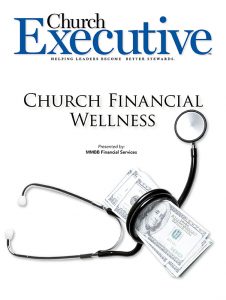
By Louis P. Barbarin, CPA
 Perhaps you have heard of or read about ‘financial wellness’ in the workplace. It’s one of the new buzzwords used to describe the range of financial services that some companies are making available to their employees.
Perhaps you have heard of or read about ‘financial wellness’ in the workplace. It’s one of the new buzzwords used to describe the range of financial services that some companies are making available to their employees.
So, just what is financial wellness?
According to Tom Rath and Jim Harter, leaders of workplace well-being research for Gallup, financial wellness is defined as “effectively managing your economic life.”
Financial wellness can also be defined as “a complex balance of the psychological, spiritual, and physical aspects of money management that results in a financially healthy life.”1 Those who achieve financial wellness are able to live a life characterized by:
• Minimal financial stress;
• An understanding of where their money is coming from and where it’s going;
• A strong financial foundation defined as little or no debt, an emergency savings fund, and living below one’s means; and
• An ongoing plan that leads the participant on a path to meet future financial goals.

Essentially, financial wellness is a state in which you practice wise planning, spending and saving with regards to the financial resources that God puts at your disposal. As many of us have learned from church Bible study and sermons we have heard from the pulpit, this is the foundation of good stewardship. Even though we all have different amounts of financial resources available to us, living with a sense of financial wellness means that you have an honest understanding of your financial circumstances and you manage them so you can be prepared for the inevitable financial adjustments that arise.
The concept of financial wellness might be a relatively new idea, but the church has been offering financial advice since the Bible was written. The Bible teaches about money and managing finances often, and offers financial wisdom as critical to a godly life. “Through wisdom a house is built, and by understanding it is established; by knowledge the rooms are filled with all precious and pleasant riches.” Proverbs 24:3-4 (NKJV)
As financial service providers recognize the specific economic challenges of the clergy and church workers — especially issues concerning debt that often cause considerable stress — they are taking a more integrated approach that addresses the totality of financial priorities.
The underlying concept of financial wellness is financial preparedness, one of the most common goals of employees today.

However, few report having access to the kinds of financial services and benefits that they feel would be most helpful. What’s missing is a more comprehensive approach to financial wellness, one that helps employees address the day-to-day financial responsibilities and deal with unexpected financial concerns while build lasting financial strength and stability.
Employer-based financial wellness is often seen as a supplemental benefit, but the financial health of employees should be viewed in the same way as other health and wellness programs that employers offer. These services don’t just take care of employees when they’re sick; they also lead to increased productivity as employees feel more confident about their financial circumstances. Who can better understand the connection between the mind, body and spirit than the church? Financial wellness programs should work in the same way, offering support and advice to employees so they can meet short-term needs while working toward long-range goals.
Each employee has different financial priorities and obligations, so a successful financial wellness program requires solutions tailored to each employee’s unique circumstances, whether the concerns are with paying off debt, establishing an emergency fund, saving for education, or retirement planning. Understanding the concepts of good financial health and having the right tools to act on that knowledge is key. Therefore, employees not only need education, but also the opportunity to take action as a result of receiving new information. For some, this simply means using software or an app to track financial goals. For others, having a financial consultant to review their finances and offer guidance helps with accountability and engagement with their goals.
When financial wellness is achieved, employees have the ability to make better, more informed decisions and manage a successful, long-term financial strategy. You might be familiar with the saying, “knowledge is power.” When people increase their understanding and acquire tools that allow them to gain a firm financial footing, it empowers them to take the steps that create financial health.
1 Financial Finesse Think Tank, 2014, Financial Finesse, Inc.
Louis P. Barbarin, CPA is Chief Executive Officer of MMBB Financial Services. Prior to assuming that role, he served as treasurer, CFO and deputy executive director. Prior to joining MMBB, Barbarin served as deputy executive director and treasurer of American Baptist Board of Education and Publication.


